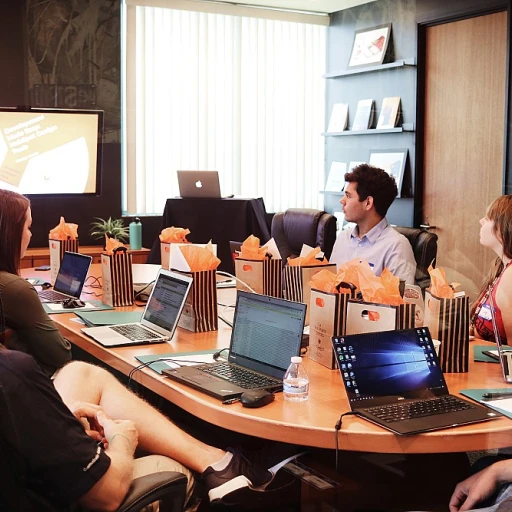
Understanding the Importance of Reskilling
The Essential Nature of Upskilling in Today's Workforce
In an ever-evolving job market, the concept of reskilling has gained substantial importance. The rapid pace of technological growth and the shift towards a more global economy have prompted significant changes in the ways companies operate. As a result, the need to learn new skills and adapt to new business environments has become critical. This trend is not just about staying relevant in the future of work; it's about thriving.
The rising demand for new expertise is evident in various sectors, including business, health, and technology. According to recent insights, factors like education technology and the expertise economy are reshaping careers. Learning new skills can help individuals compete and succeed in this dynamic landscape, enhancing their career prospects and fostering personal growth.
This essential transformation in the workforce has been strongly supported by thought leaders in the industry. As companies recognize the value of continuous learning, they are increasingly investing in employee development initiatives. In fact, some of the smartest companies are actively engaging in reskilling strategies to maintain their competitive edge.
The role of educational institutions, such as state universities, in this evolution cannot be understated. They provide the foundational support for learning and innovation, preparing students for the opportunities and challenges of the future economy. Furthermore, companies are looking to these institutions to help bridge the skills gap and lead the charge in driving economic progress.
Understanding these shifts is crucial for individuals seeking to navigate their careers successfully. For more comprehensive insights into how a learning-driven approach in reskilling can influence your career trajectory, exploring industry trends and adapting to new challenges is essential for personal and professional development.
Kelly Palmer's Approach to Reskilling
Embracing a Learning-Driven Approach to Skill Development
Kelly Palmer, a recognized thought leader in the field of skill development, emphasizes the necessity of adopting a learning-driven approach as the workplace continues to evolve. As businesses adapt to technological advancements and shift toward a future-oriented economy, Palmer, along with other industry leaders, underscores the critical role of continuous learning and its impact on sustainability and growth. In today's dynamic job market, learning is not just about acquiring new skills but also about engaging with the ever-changing demands of work environments. This approach, championed by Palmer, reflects a deep understanding of the modern expertise economy, where the ability to learn and adapt is as essential as the skills themselves.Insights from a Chief Learning Officer
As a former Chief Learning Officer in Silicon Valley, Palmer brings a wealth of experience and insight into the conversation on skill development. Her perspective suggests that successful reskilling strategies often stem from a comprehensive understanding of how learning can be integrated into a company's core business strategy. According to Palmer, companies that prioritize learning opportunities not only better equip their employees to deal with industry-specific changes but also position themselves as adaptable and forward-thinking entities. Furthermore, engaging with a structured learning process tailored to individual career paths can aid in smoother transitions for workers. This not only benefits individuals but also enhances the overall health and resilience of a company. Palmer's exploration into personalized learning journeys serves as a blueprint for companies looking to remain competitive by investing in education and ongoing skill enhancement.Navigating the Reskilling Landscape
Palmer's approach highlights the importance of cultivating a learning mindset, especially within industries like public health and education technology, which require constant adaptation. The smartest companies understand that by fostering an environment where learning is part of the organizational culture, they can ensure they stay relevant and competitive in future work landscapes. For businesses aiming to thrive in the future, adopting a forward-thinking approach to skill acquisition is crucial. By prioritizing learning-driven strategies, companies can better prepare their workforce to engage and compete successfully in the marketplace, thereby safeguarding their place in the evolving economic landscape. For a deeper dive into this topic, consider reading about the learning-driven approach in reskilling to better understand how this perspective can be applied across various industries.Challenges in the Reskilling Journey
Overcoming the Hurdles in Skill Transformation
In the world of economic change, reskilling has become an imperative strategy for workers and companies looking to compete and succeed in the future work landscape. However, the journey towards acquiring new skills is not free from challenges. Even the smartest companies encounter hurdles while adopting new learning paradigms.
One of the primary challenges is aligning the pace of skill transformation with the rapid advancements in education technology. The need for swift adaptation often clashes with existing institutional structures, making it difficult for individuals to grasp a hold of new learning skills effectively. As Kelly Palmer emphasized, leveraging technology is vital for creating dynamic learning environments, yet history shows that integration often requires overcoming legacy systems and mindsets.
Businesses and thought leaders also encounter the issue of tailoring learning initiatives to match the unique expertise and learning styles of their workforce. Personalization is key, but it demands resources, consistent engagement, and the expertise economy’s support to ensure meaningful progress. State universities and companies must therefore collaborate with chief learning officers to ensure curriculums meet the evolving demands of future work.
Public health becomes another consideration, especially with recent events highlighting the necessity of virtual learning environments. Leaders in the learning space, including those from Silicon Valley, have had to rethink strategies to enable remote work and training without compromising quality or employee well-being.
- Finding a balance between digital and human interaction.
- Managing costs without sacrificing skill depth.
- Ensuring that privacy policies are adhered to during online training sessions.
Another significant hurdle is fostering a culture that embraces change. Often, resistance to learning and adapting new skills may emerge from uncertainty about career trajectories or the lack of immediate incentives.
Companies must adopt strategies that not only communicate the future benefits of skill enhancement but also engage employees with transparent pathways and histories of success within their organizations. Palmer, as a learning officer, has often addressed the need for open dialogue and collaborative problem-solving to overcome these barriers, advocating for a rights reserved approach that empowers employees with the autonomy to drive their learning journey.
The Role of Technology in Reskilling
The Influence of Technological Advancements on Reskilling
Understanding the ever-evolving landscape of reskilling requires acknowledging the significant role technology plays. As technology permeates various facets of work and learning, it simultaneously becomes both a catalyst and a tool for reskilling. Education technology has emerged as a vital component in shaping the future of work, providing avenues for individuals to gain new skills and remain competitive in the expertise economy. The smartest companies are increasingly leveraging technology to engage and equip their workforce with the necessary proficiencies. These companies recognize that fostering learning skills is crucial not only for individual careers but also for the overarching health of the business. Moreover, state universities and other educational institutions are beginning to integrate advanced technological solutions into their curriculums. This strategic incorporation aids in bridging the gap between traditional education and the skills required by future-focused industries. Technology serves as a connective thread, offering tailored learning experiences that enhance the capacity for individuals to learn efficiently. This is particularly pivotal in an era where contact with innovative strategies can be more impactful than ever before, especially under the guidance of thought leaders like Kelly Palmer in Silicon Valley. In the narrative of reskilling, technological tools such as AI-driven platforms, online learning modules, and immersive virtual environments present unprecedented opportunities. These tools are not just altering the way knowledge is acquired but are also reshaping the methodology of reskilling processes. For businesses and individuals alike, embracing these advancements is essential. They afford a pathway to engage and compete in a market defined by rapid technological shifts and ensure that learning is an outcome-driven endeavor rather than a checkbox in professional development.Creating a Personalized Reskilling Plan
Designing a Tailored Pathway for Skill Development
Creating a personalized reskilling plan not only sets the groundwork for developing new skills but also ensures alignment with one's career aspirations amidst the evolving expertise economy. As we delve into shaping a roadmap for skill enhancement, key insights from Kelly Palmer and other thought leaders can provide valuable direction. One of the primary steps in crafting this personalized plan is to identify your career goals and the skills required to compete and succeed effectively in your desired field. It's crucial to assess your current skill set against the demands of the future work landscape, allowing for a focused approach to learning. Consider these guiding principles when developing your reskilling plan:- Assessment of Current Skills: Begin with a thorough evaluation of your existing learning skills. Understanding your baseline capabilities is essential for mapping out areas in need of growth.
- Identify Skill Gaps: Pinpoint the specific skills that are increasingly becoming necessary in your field. Companies, particularly those in Silicon Valley, are constantly on the lookout for new expertise, necessitating a proactive development of abilities that align with industry standards.
- Engage with Learning Opportunities: Leverage resources provided by companies learning programs and educational institutions like state universities. Engage in courses and workshops tailored to the business and technological transformations impacting your sector.
- Utilize Education Technology: Incorporate tools and platforms that offer personalized learning experiences. The smartest companies and leaders advocate for utilizing technology not only to learn but to dynamically adapt your learning pathways as industries shift.
- Monitor Progress and Adapt: Regularly review your progress and remain flexible to changes in your career objectives or industry dynamics. Palmer highlights the importance of evolving your plan as you acquire more knowledge and expertise, ensuring it remains relevant.













